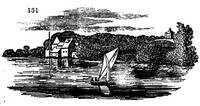426. The ferme ornee of M. Hauch, situated on the Esrom Lake. This scientific gentleman has introduced a style of rural architecture which gives the proprietor all the benefits of a residence in the country without occasioning heavy and useless expense. Having cleared a considerable tract of land, which had formerly been forest, in the vicinity of the Esrom lake (fig. 131.), he allotted it, in small divisions, to a great number of cottagers. In an elevated part of the estate, he has built a two-story dwelling, in a neat and unassuming style. It possesses an extensive view of the country, and will itself form a most interesting object, when the adjacent cottages shall wear that general appearance of comfort and happiness, to which they are rapidly advancing under the auspices of this nobleman. At a short distance from his seat he has laid out a farm on the most approved principles, that the neigh-bouring cottagers may derive the best guidance, in the culture of their plots of ground, from what they see practised. M. Hauch's gardens and plantations have also been the means of turning the attention of the cottagers to an improved method of horticulture, and of making fences, in which the peasantry of Zealand were generally very deficient. The Rev. Mr. Junge, in his invaluable work on the character, customs, opinions, and language of the peasantry of North Zealand, mentions that hedging was diametrically opposed to the peasant's principles of agriculture. The learned author had himself seen quickset hedges ruined in the course of a night, long rows of young timber trees irrecoverably broken, and the tops of fruit trees cut off, just as the savages of Louisiana do, that they may pluck the fruit with greater ease. He proposes to remedy these evils by the enforcement of an old law in Holstein, by which every young man was obliged to plant a dozen of trees before he could ask the minister to read the banns for his marriage; and for every son with which God blessed him, he had besides to plant six or eight trees.

